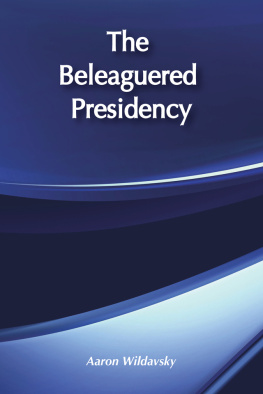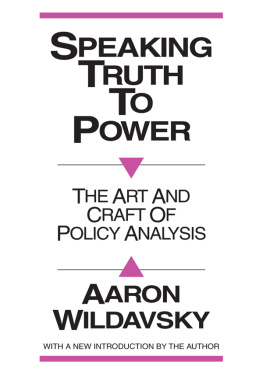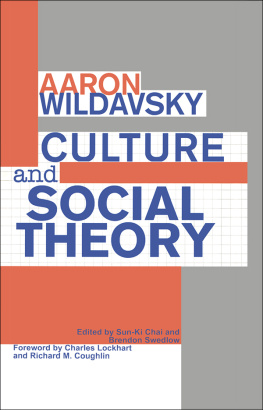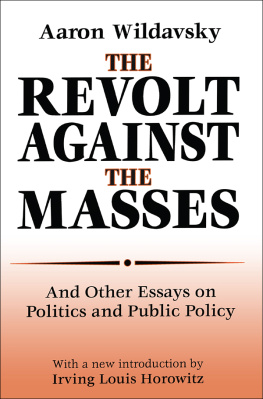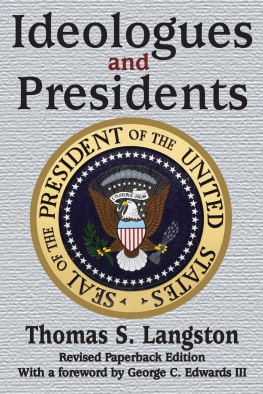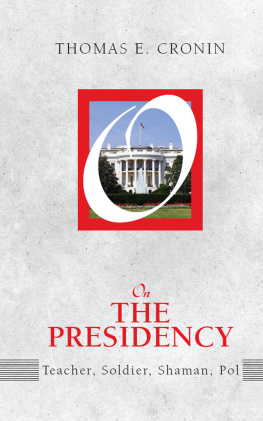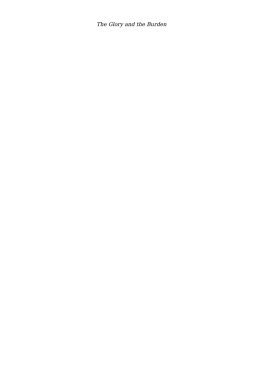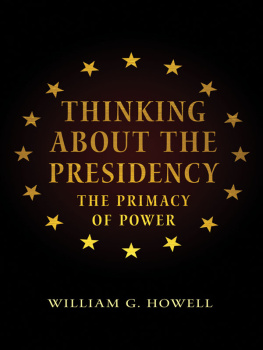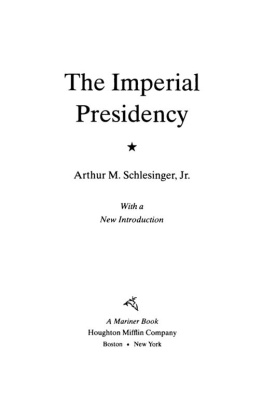THE BELEAGUERED PRESIDENCY
The Beleaguered Presidency
Aaron Wildavsky
First published 1991 by Transaction Publishers
First paperback edition 1994
Published 2017 by Routledge
2 Park Square, Milton Park, Abingdon, Oxon OX14 4RN
711 Third Avenue, New York, NY 10017, USA
Routledge is an imprint of the Taylor & Francis Group, an informa business
Copyright 1991 by Taylor & Francis.
All rights reserved. No part of this book may be reprinted or reproduced or utilised in any form or by any electronic, mechanical, or other means, now known or hereafter invented, including photocopying and recording, or in any information storage or retrieval system, without permission in writing from the publishers.
Notice:
Product or corporate names may be trademarks or registered trademarks, and are used only for identification and explanation without intent to infringe.
Library of Congress Catalog Number: 9046282
Library of Congress Cataloging-in-Publication Data
Wildavsky, Aaron B.
The beleaguered presidency/Aaron Wildavsky.
p. cm.
Includes bibliographical references and index.
ISBN 0887384013
1. PresidentsUnited States. 2. Political cultureUnited
States. 3. United StatesPolitics and government1945
I. Title.
JK511.W54 1991
353.03'13dc20 9046282
CIP
ISBN 13: 978-1-56000-754-8 (pbk)
Samantha Rosen, then a student at the Georgetown University Law Center, helped me in numerous ways. She brought the chapter on presidential succession and disability up to date. She discussed every chapter with me, making suggestions for deletions and additions, many of which I adopted. And she helped me understand what a younger generation wanted to know about the presidency and why. I am grateful for her insightful and enthusiastic contribution.
I owe a debt to the friends with whom I have discussed the presidency over the yearsDave Barber, Fred Greenstein, Nelson Polsby, Austin Ranney, Raymond Wolfinger, and James Young. The revisions, reformulations, and reconsiderations in this volume owe a great deal to their good sense and acute observation.
Students at Oberlin (195862), Berkeley (196388), and the Georgetown University Law Center (198990, on leave as Interdisciplinary Visiting Professor) have asked better questions than I could formulate answers. Over the years, as presidents have become more and more beleaguered, these students have asked for explanations. Why are presidents in trouble? Do they have too much power or too little? How, from day to day, can they appear alternately strong and weak? How come past presidents seem so much smarter than present presidents? The emphasis of this book on answers to such questionsmost of what is usually found in a text on presidential power is here, when such information is necessary to help solve a problemI owe to my students.
If any group of people is more perplexed than students it is their parents, who remember a time when presidents were mostly admired and only sometimes beleaguered, instead of the reverse. Where, they want to know when I talk about the presidency, have all the good presidents gone? The Beleaguered Presidency is for them, too.
In rereading and reworking these essays, which constitute the second volume of my collected papers, I was struck by their consistent theme: the presidency is in trouble, for criticism was rising and approval declining, while demands were impossible to meet. At first, I thought the problems were inherent in the nature of events. History was giving recent presidents a bum rap. Problems were harder to solve. Constituencies made contradictory demands that could not all be met. Perhaps some of the aberrations of presidential behavior, from Lyndon Johnson in Vietnam to Richard Nixon in Watergate to Jimmy Carter in micromanagement, were due not entirely to their defects but were forced on them by their political environments.
As time passed, however, I began to believe that events cannot force themselves on our consciousness. It is human beings and they alone who are the active organizers of their perceptions, not events or things. Absent force by other human beings, there had to be another explanation. After all, these presidents did many good things, from the opening to China (Nixon) to major (and long overdue) civil rights legislation (Johnson). Why, then, the uniformly negative tone toward them?
Briefly, I was attracted to what were called "new class" explanations. For some reason, a segment of the middle and upper-middle classinformation specialists and professionals of various kindshad set itself up in opposition to established authority. Its interests were self-serving (fame, income, environmental protection against upstarts), all the more insidious for being hidden. Soon, however, this class explanation began to pale. Why people who were generally better off would want to do this was never stated. Why would wordsmiths bite the hand off of which they fed? And why were other people, similarly situated, like me, opposed to their views? Gradually I became interested in explanations in which culture was used as a synonym for a way of life. The question that appealed to me was: What sort of people, organizing themselves into which ways of life (that is sharing values that justify corresponding sets of social relations), would want to subject people in authority, especially presidents, to ceaseless criticism in order to do what every group must, namely, support its way of life and denigrate others?
Cultural answers to this supremely political question appealed to me because they made sense out of my observation and reading; People who prefer a hierarchical social order might be punitive or secretive, but the last thing they would do is tear down authority. Scratch one. Fatalists do not launch campaigns; it takes too much effort and no reason to believe it will pay off. Fatalists are in the mode of accepting or avoiding, not criticizing, authority. Down two. Hermits who inhabit the contemplative culture are in the business of observing the world, not changing it. Hermits extinguish desire; they do not fan the flames of controversy. Three gone. Individualists might fit the bill because they seek to substitute self-regulation for authority. But these competitive individualists are pro, not anticapitalist; they criticize socialism, not capitalism.
It makes social sense for egalitarians to criticize leadership because they regard followership as a form of subordination (i.e., of inequality). Converted by the civil rights movement into belief in greater equality of condition, training its adherents to spur and spawn other egalitarian movementswomen's rights, gay rights, children's rights, animal rightsthey attack existing authority as a sign of their opposition to inequality. Put in cultural terms, egalitarians oppose hierarchies because of their coerciveness, and they oppose individualism because it generates inequality.
In our time, the egalitarian attack on authority takes on two characteristic forms: environmental safety (corporate capitalism causes cancer) Here, I am concerned with attacks on presidents as the most visible symbol of public authority in the United States.
Of course, not everyone agrees that presidents are under attack. If you feel that a president deserves far more censure than he gets, then he is never criticized enough, no matter how severe the attack. My claim is that the Johnson presidency (19631968) ushered in a quantum increase of criticism amplified through the media. This was the time during which press conferences became battle grounds, reporters exposed rather than excused personal misbehavior, the networks started contradicting presidential addresses as soon as they were made, and politicians in general became fair game.

